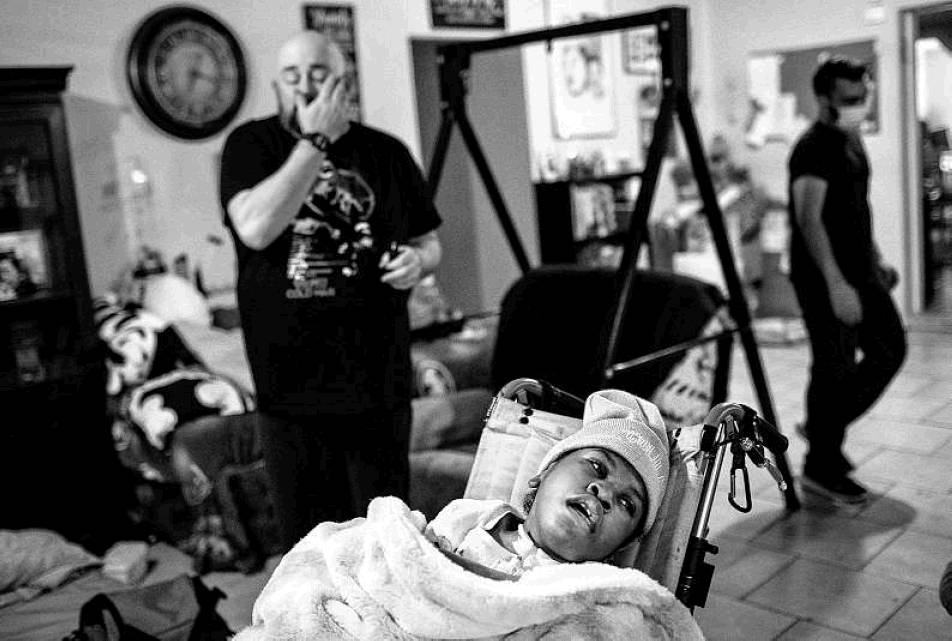Despite law, disabled Texans still at risk in disasters
By St. John Barned-Smith STAFF WRITER
Gary Lynn, 28, lives in Spring and has cerebral palsy severe enough that he has limited mobility and needs a wheelchair to get around. When the deep freeze descended on Texas in early 2021, he and millions of other Texans lost power.
For Lynn and other disabled Texans, the extreme weather was more than an inconvenience. It was life-threatening. A law passed later in 2021 was supposed to help ensure that disabled Texans got help in times of emergency.
But as winter again descends on Texas, a Houston Chronicle investigation found that city officials are confused about how to implement the new law and that disabled Texans are just as vulnerable as they were last year.
Medically fragile Texans such as Lynn are particularly exposed during disasters. During the deep freeze, for example, the Chronicle investigated the storm’s toll, finding that many people died when they ran out of supplemental oxygen, when their breathing machines failed or when they were unable to receive needed medical treatments such as dialysis.
For Lynn, the cold temperatures were especially perilous because his medical condition meant he couldn’t move around easily and had a harder time staying warm. As the hours passed, the temperature in his home plunged below 40 degrees. His feet swelled, then turned purple, and he was worried for a time that doctors might have to amputate them. Lynn and scores of other disabled Texans said they were essentially on their own during the crisis.
And while the state has registries that disabled residents can use to alert emergency planners of their needs and conditions — which could theoretically be shared with first responders — that information received little use during the deep freeze.
After the freeze, lawmakers passed SB 968, which required municipalities to check on their disabled residents in times of emergencies.
The law requires cities and counties to check on certain residents — suffering from Alzheimer’s disease or debilitating chronic illnesses, dialysis patients, those dependent on oxygen treatment or who have medical conditions that require 24-hour medical supervision — who register on the State of Texas Emergency Assistance Registry, or STEAR.
State Rep. John Bucy III, D-Austin, proposed the legislation after learning a constituent who lived a few streets over from him died, alone, because he failed to get critical dialysis treatment during the storm.
But as Texas cities attempt to comply with the law, the Chronicle found that disabled Texans remain vulnerable.
“I don’t think that SB 968 improved our readiness posture,” said Gabriel Cazares, director of Houston’s Office for People with Disabilities.
Disability Rights Texas attorney Stephanie Duke said that state officials have provided little clarity on how their plans will actually work or information to municipalities about how to follow the new law.
Local emergency planners need top-down guidance, she said.
“(The Texas Division of Emergency Management) has failed to prioritize disability-related needs or hire subject matter experts,” she said. “Combine that with a volunteer registry, no mandate and no support, our most vulnerable get left behind.”
She also wondered whether emergency planners would review other information that could help their disaster response plans, such as looking at transit rosters or other lists to make sure there are enough vehicles to evacuate medically fragile Texans during emergencies.
“It’s not a one-and-done solution,” she said. “There needs to be knowledge of a community’s needs and inclusive planning such as bringing the right people to the table and then planning for those needs to ensure community lifelines are sustained.”
State officials bristled at criticism and said they were continuing to “work through the rule making process.”
A TDEM spokesman said the agency has updated its questionnaire and website, which should give local officials access to more detailed information about the needs of their communities. In an emailed statement, a spokesman batted back questions about whether the new law amounted to an unfunded mandate, saying “anyone who is critical of helping the most vulnerable in our communities during disasters may need to reconsider their role in the process.”
Bucy, the original sponsor of the legislation, also pushed back, saying that because the law deals with emergency management, cities would be able to get reimbursed for some of the expenses it would entail.
“There is money already allocated for emergency management,” he said, “so in the event a wellness check is needed, counties can pull from state emergency funds.”
Cazares noted that because lawmakers did not provide any financial resources to help implement the requirements of the law, some municipalities might be even less likely to try to use the program in the future.
What was needed, he said, was a dramatic overhaul to how cities think about emergency preparedness.
Cazares’ colleagues within the city’s office of emergency management declined interview requests, saying they were still working out details on how they will apply the requirements of the new law.
But critics pointed to potential concerns such as a lack of visibility and raised questions about whether emergency planners would look at other data, such as paratransit rosters, to help identify a wider population of disabled or medically fragile residents in their communities. Some states, such as Colorado and Washington, have hired disability access functional needs specialists to work in their state emergency management departments, said Duke, the disability rights attorney.
“That knowledge (at the top) helps bring in the right groups at the local level to have that inclusive planning,” Duke said. Advocates for the disabled and medically fragile have repeatedly urged TDEM to hire a disability integration specialist over the past few years, but the agency has refused to make such a hire.
City Council member Abbie Kamin said the current situation points to a “disconnect” at the state level and was part of a broader pattern of state officials passing rules down to local municipalities without guidance or funding.
“Houston is making a good faith effort to meet the requirements of the law,” she said. “But once again we’re seeing an unfunded mandate by the state with no support.”
She noted that the state’s updated information pamphlets about STEAR stress different municipalities use the information different ways, meaning disabled residents still have no assurance they’ll actually get help if they submit their info to the database.
“It’s just like, ‘Great, here’s this registry,’ ” she said.
Austin city officials said they were still waiting for directions from state emergency management officials. Absent those instructions, emergency management officials are planning to use STEAR to contact people through the city’s regional emergency notification system, said Austin Office of Emergency Management spokesman Bryce Bryce Bencivengo.
The system allows residents to receive a phone call, text message or email, he said. It also allows city officials to ask residents questions about needed services.
Like Cazares, Bencivengo noted that the registry would help only the residents who had added their information to the database.
“This is incumbent upon people registering in the STEAR system,” he said.
Officials in San Antonio and Dallas have not yet responded to questions from the Chronicle. st.john.smith@chron.com twitter.com/stjbs

